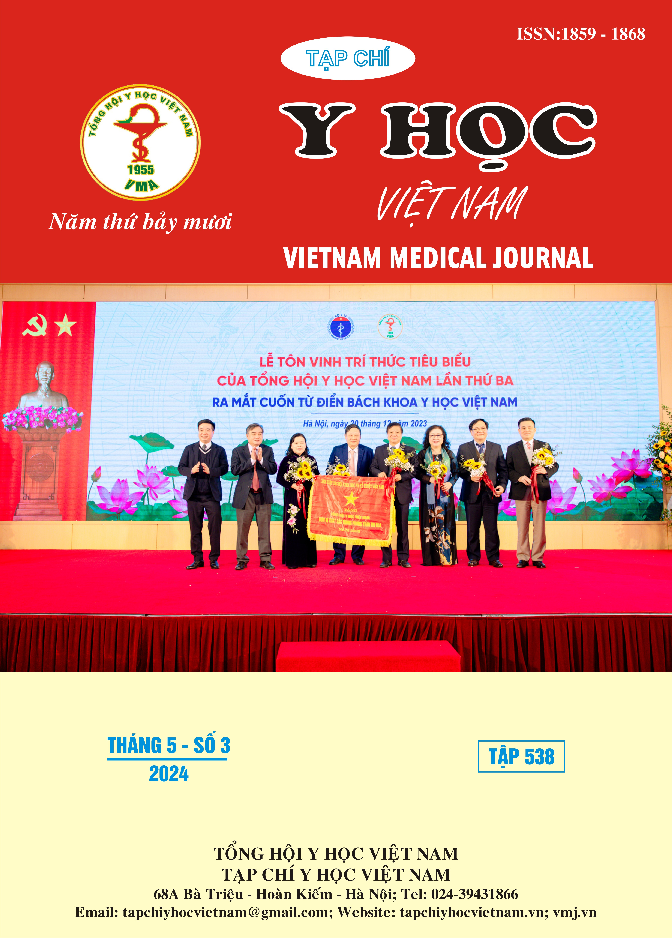EVALUATION OF FOOD SAFETY SELF-MANAGEMENT TEAM ACTIVITIES OF COLLECTIVE KITCHEN IN DAU TIENG DISTRICT BINH DUONG PROVINCE IN 2023
Main Article Content
Abstract
Background: Food poisoning in communal kitchens is often due to many reasons such as unsanitary conditions, limited knowledge and practices of the person directly processing it, and the nature of the food being contaminated with agents. microbiology, unsafe ingredients... In particular, food safety supervision by the food safety self-management group (referred to as the self-management group) is one of the factors that directly affects the issue of food safety assurance. Ensuring food safety in collective kitchens. Therefore, we carry out the project: "Assessing the activities of self-management food safety teams of collective kitchens in Dau Tieng district in 2023" to come up with solutions to good control of food safety issues. at collective kitchens. Objective: Determine the results of the Self-Management Group's activities related to the food safety situation in collective kitchens in schools and businesses in Dau Tieng district in 2023 and related factors to propose solutions. measures to prevent food poisoning. Research method: Cross-sectional descriptive study, survey of all self-management team members of 38 collective kitchens of schools and businesses in Dau Tieng district: including 36 preschools, primary schools, and secondary schools. elementary school and 02 businesses. Research period is from September to November 2023. Data are entered and processed using Microsoft Excel software. Results: 68.2% of self-management group participants have correct knowledge about food safety regulations for collective kitchens; Over 80% of participants in the self-management group are aware of and strictly comply with the operating regulations of the self-management group; 99.5% of self-management teams of schools and businesses fully implement the operational records of self-management teams; 55.7% of self-management group participants are administrative staff aged 25-35 years old with university/postgraduate degrees and 5 years of work experience or more with correct knowledge about safety. food and awareness and proper practice of self-management group activities. Conclusion: Research results show the necessity of food safety self-management groups and the important role of regular inspection and supervision to contribute to ensuring food safety in collective kitchens
Article Details
Keywords
Food safety self-management group, food poisoning, collective kitchen.
References
2. Bộ Y tế (2017), “Quyết định số 1246/QĐ-BYT, Ngày 31/3/2017 của Bộ trưởng Bộ Y tế ban hành hướng dẫn thực hiện chế độ kiểm thực ba bước và lưu mẫu thức ăn đối với cơ sở kinh doanh dịch vụ ăn uống”.
3. Uỷ ban nhân dân tỉnh Bình Dương (2010), “Chỉ thị số 03/2010/CT-UBND, ngày 21/7/2010 của UBND tỉnh Bình Dương về việc tăng cường phòng ngừa ngộ độc thực phẩm trên địa bàn tỉnh Bình Dương”.
4. Uỷ ban nhân dân tỉnh Bình Dương (2019), “Chỉ thị số 19/CT-UBND,ngày 24/9/2019 về việc tăng cường hiệu quả, chất lượng công tác đảm bảo an toàn thực phẩm, phòng, chống ngộc độc thực phẩm tại các bếp ăn tập thể, căn tin có kinh doanh ăn uống trong cơ sở giáo dục, đơn vị trường học trên địa bàn tỉnh Bình Dương”.


